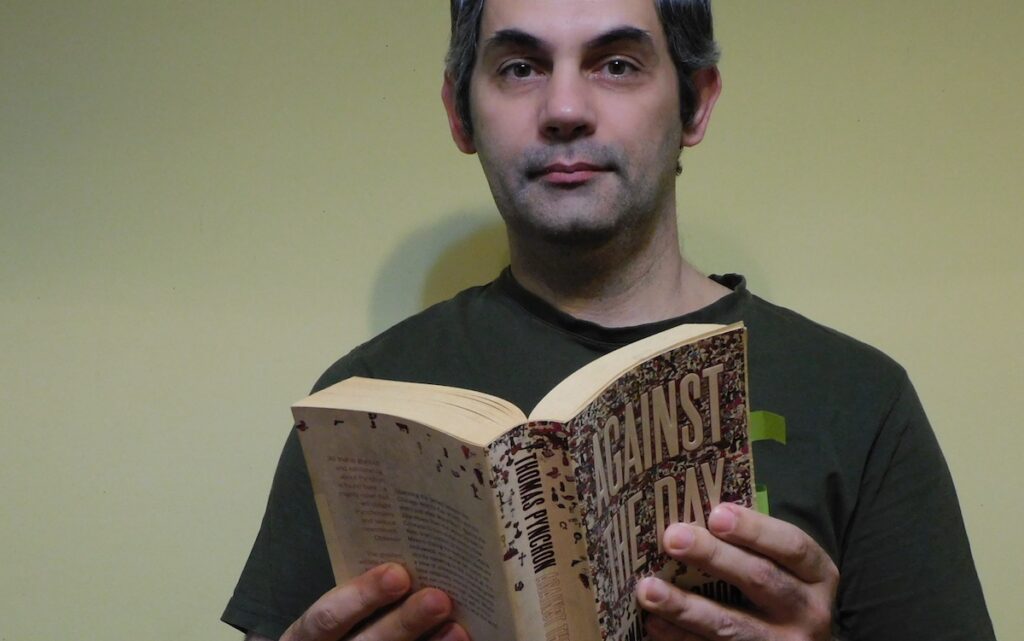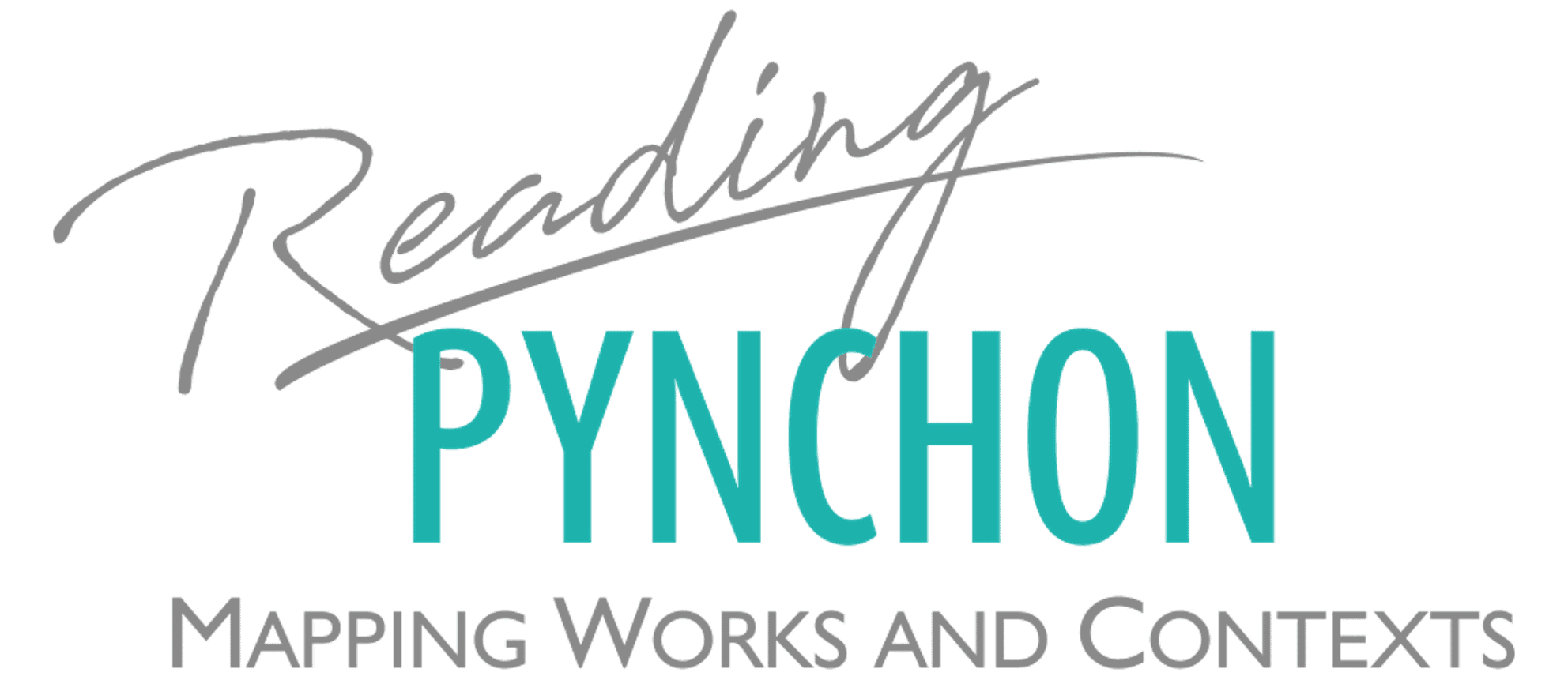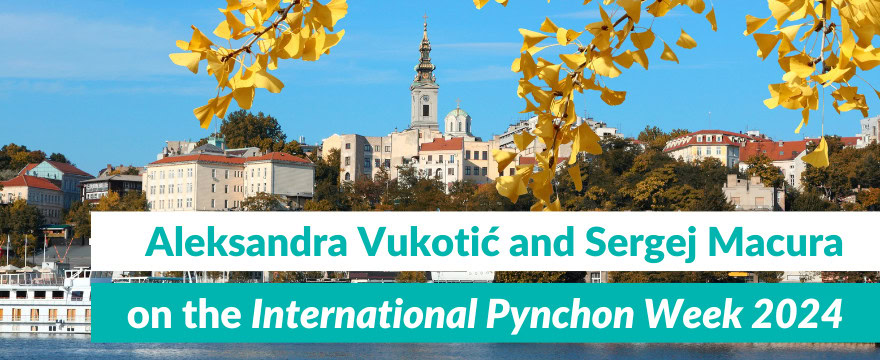The extent of Pynchon’s knowledge and his vibrant sense of humanity never cease to amaze me.
Aleksandra Vukotić
The more I read his texts, the more aware I became of the layers and nuances in the representation of characters, the construction of his possible worlds, and finally of the reward I received in the warmth of his humanistic vision.
Sergej Macura
Keeping a tradition alive: Interviewing the organizers of the IPW
Again, I do owe a lot of gratitude to the new organizers of the International Pynchon Week (IPW), Aleksandra Vukotić and Sergej Macura. They have helped keep a tradition alive: As organizers of the IPW 2024 they talk about “Pynchon” and their experiences when reading Pynchon, their favorite novel(s) by Thomas Pynchon, and, last, but not least, about organizing the IPW in Belgrade – Global Encounters, from June 17-21, 2024.
The conference program of the International Pynchon Week offers sessions and presentations by well-known and new “Pynchonians”, i.e. Pynchon scholars, alike, who thus contribute to the chronology of conferences on Pynchon.
You can find my updated list of conferences on Pynchon below! Not all of them were called “International Pynchon Week” and there have definitely been more Pynchon conventions than those I have listed so far.
If you can think of anything to add to the list (other IPWs (in 2000?), conference title, names of organizers, and possibly publications of contributions), please do let me know – simply by commenting on this blog entry at the end of the blog post or by shooting me an email, e. g. via the Contact Form.
Chronology of International Pynchon Weeks et al.
| Year | Location | Date | Title |
|---|---|
| 1994 | Warwick, England (November): Schizophrenia and Social Control |
| 1998 | Antwerp, Belgium: Gravity’s Rainbow: The First 25 Years – organized by Luc Herman – proceedings to the conference in Pynchon Notes, nos. 42-43 London, England: Beyond the Rainbow’s End – organized by Eric Weinstein – articles in Abbas 2003 |
| 2002 | Cologne, Germany (14-16 June): site-specific: from aachen to zwölfkinder – pynchon | germany – organized by Hanjo Berressem – articles in a special edition of Pynchon Notes |
| 2004 | Valletta, Malta – organized by Vaska Tumir |
| 2006 | Granada, Spain – organized by Celia Wallhead – proceedings to the conference in Pynchon Notes |
| 2008 | Munich, Germany: Against the Grain: Reading Pynchon’s Counternarratives – organized by Sascha Pöhlmann – proceedings published in Pöhlmann 2010 – newspaper report by Die Welt (German newspaper) – report by Bruno Arich-Gerz (on electronic book review) |
| 2010 | Lublin, Poland – organized by Zofia Kolbuszewska – proceedings published in Kolbuszewska 2012 |
| 2013 | Durham, England – organized by Sam Thomas with the help of Martin Paul Eve – report by Martin Paul Eve on the conference: Eve 2013 |
| 2015 | Athens, Greece – organized by Georgios Maragos |
| 2017 | La Rochelle, France – organized by Bénédicte Chorier-Fryd and Gilles Chamerois – official website |
| 2019 | Rome, Italy (11-14 June): Pynchon in Rome – organized by Umberto Rossi, Paolo Simonetti, and Giorgio Mariani – official website |
| 2021 | Vancouver, Canada – did not take place due to the COVID-19 pandemic |
| 2022 | Vancouver, Canada (6-10 June) – organized by Jeff Severs – official website |
| 2024 | Belgrade, Serbia (17-21 June) – organized by Aleksandra Vukotić and Sergej Macura – official website |
The organizers of the International Pynchon Week 2024
Aleksandra Vukotić teaches Postmodern American Literature and Modern Irish Short Story at the English Department of the University of Belgrade, Faculty of Philology. Her book Don DeLillo i poetika istorije (Don DeLillo and the Poetics of History) was published in 2018. Aleksandra’s interests include contemporary American and Irish literature, critical theory, literary spatial studies, literature and technology, film and media studies. She is the Vice-President of the Serbian Association for American Studies.
Sergej Macura has been Assistant Professor of American Literature at the University of Belgrade, Faculty of Philology since 2016. Along with Aleksandra Vukotić, he organizes the International Pynchon Week 2024. He has published numerous articles on Pynchon’s works (e.g. Macura 2017) and, additionally, on Shakespeare, Hemingway, and, most recently on Francis Ford Coppola’s Apocalypse Now.
That’s it, folks! Now go ahead and read what Aleksandra Vukotić and Sergej Macura have to say about their “personal Pynchon” and about organizing the International Pynchon Week 2024!
Interview with Aleksandra Vukotic and Sergej Macura
On Pynchon and his works
Reading Pynchon: What was the first Pynchon novel you read?
Aleksandra Vukotić: It was The Crying of Lot 49. The first time I read it was during my college years, and it left a great impression on me. I remember our professor drawing our attention to the paradoxes and contradictions which, contrary to common practice, we were not supposed to resolve but appreciate and reflect on. It marked a Copernican turn in my approach to a literary text, and I keep returning to Pynchon for (im)possible interpretative paradigms in my research.
Sergej Macura: My first contact with Pynchon’s fiction took place in the 1996/97 academic year, when I was studying in the third year of English at the Faculty of Philology, University of Belgrade. We followed a two-semester survey course in American literature from Protestant settlers to postmodernism. The novel assigned was The Crying of Lot 49, and if memory serves well, I read it in the spring of 1997. Its relative brevity was a hermeneutic trap, since I had to follow every meandering sentence closely and try to avoid possible misses in the narrative’s tight tapestry. The other point was related to its metaphor of entropy, which was supposed to account for the loss of information and increase in noise not only in the electronic industry, but in society as a whole – that concept was the gateway to the paradoxical act of reading a novel where almost nothing happens by realistic standards, and so far, I had not encountered almost anything with such a decided open ending.
Reading Pynchon: What do Pynchon’s novels mean to you?

Aleksandra Vukotić: Recently, I came across an interview from 1982 in which Don DeLillo expresses his indebtedness to Thomas Pynchon, stating that Pynchon “more than any other writer, has set the standard” and “raised the stakes” for the contemporary American author. In the interview DeLillo refers to himself as a member of “Pynchon’s generation” of writers. Although I am not a Pynchon scholar, I consider myself among the members of “Pynchon’s generation” of readers, those whose hermeneutical sensibilities have been tremendously heightened and, in a sense, reprogrammed by Pynchonian algorithm (“it’s code’s all it is”).
Sergej Macura: Later on, as a postgraduate, I took to reading his other works, but now I don’t recall in what exact order – this question in Pynchon is even less important given the vast array of his topics, locales, characters, encyclopaedic references, and my own experience of reality was greatly enriched through his low and high styles in humour, from custard pie fights to strictly verbal juggling and sarcasm. The more I read his texts, the more aware I became of the layers and nuances in the representation of characters, the construction of his possible worlds, and finally of the reward I received in the warmth of his humanistic vision. In terms of credibility and verisimilitude, detail and narrative causality, Pynchon stands side by side in my mind with Umberto Eco, and I can’t see any third author who could supply me with so many thought-provoking passages while maintaining the pleasant aspect of literary life – the plain and simple delectare.
Reading Pynchon: Which Pynchon novel or short story is your most favorite one today? Please, explain why.
Aleksandra Vukotić: Bleeding Edge is my favourite at the moment, possibly because I am now reading it more closely than ever for my conference paper [i.e. for the IPW 2024]. The extent of Pynchon’s knowledge and his vibrant sense of humanity never cease to amaze me.
Sergej Macura: Perhaps the answer to the question of any favourite novel depends on the moment of asking, and it can produce various inexplicable outcomes. On the relative spur of the moment, I may tentatively select Against the Day, not because of its record-setting volume in Pynchon’s opus, but on other grounds. The framework always keeps its stylistic features in the genre of Victorian adolescent novels, which are brimful with hilarious adventures seemingly without end. The dirigible as their means of transport and, we could say, their permanent abode, lets us in on a platform high above ground and fortifies our inner children, I believe, even if the readers are women. The eternal adolescents can credibly fly into other dimensions, go back and forth through time, and experience so much Indiana Jones or Tarzan excitement that the book never fails to relax the reader when the Chums of Chance are on duty. The other strand, more serious in theme, only reinforces my opinion that Pynchon is capable of combining the comical with the hard-boiled like few authors of this age.
Reading Pynchon: What aspect of Pynchon’s literary work are you most interested in? In other words: If you had the time and means to write a (new) book on Pynchon – what aspect of his works would you focus on?
Aleksandra Vukotić: There are so many aspects to explore, but lately I have been particularly interested in the poetics of technology in Pynchon’s works. However, right now I can’t imagine myself writing an entire book on Pynchon, a chapter seems more feasible.
Sergej Macura: There is something cozy and homely in Pynchon’s depiction of the so-called little people, like Prairie and her dad, Oedipa and her husband, Mason and Dixon in the pauses of their globe-trotting adventures, especially when the author creates a tangible connection between the characters and their overall context in the historical, geographical, urban, architectural and educational senses. Perhaps I may be most interested in the dismantling the boundary between the Elect and the Preterite in every text that Pynchon has written, as I consider that episteme to be fraught with social and conceptual segregation. Existence doesn’t amount to much if the majority are spending it in an unchangeable, predetermined universe, where the most sympathetic characters suffer at the hands of exploiters in every era he modelled since the onset of the Enlightenment project.

I have covered almost every text by Pynchon, with some success that gives me a dose of satisfaction, although most of my research is in Serbian, inaccessible to the global audience. I wrote a PhD on his narrative techniques, relying on classical structuralist analysis – Uspensky, Genette, Cohn and Booth, so a circle was completed. If I were to write a longer study nowadays, I would probably opt for an extrinsic reading of Thomas Pynchon, following the sociological turn in the humanities, which has been going on for a quarter of a century. One major author to follow would certainly be Tore Rye Andersen, who in Planetary Pynchon: History, Modernity and the Anthropocene (Cambridge University Press, 2023) suggests that “Gravity’s Rainbow, Mason & Dixon and Against the Day all aim wider than an ambition to write Great American Novels about Americaˮ (p. 5) and demonstrate his desire to see the nation from the outside. Rather than seeing America from the outside, I would devote some time to the study of these three novels as a huge encyclopaedia of modernity’s folklore, science, technology, politics and their interactions over a 200-year period. Naturally, they also point to issues in the external world, the planet and its general issues present at the time of publication, which makes these novels useful inquirers into our genuine political and historical reality.
Organizing the International Pynchon Week 2024 in Belgrade
Reading Pynchon: Please tell us about your hopes and expectations for the International Pynchon Week 2024 in Belgrade.
Aleksandra Vukotić: I am very excited about it. I don’t know what I look forward to more, hearing the paper presentations, which look very stimulating and intriquing, or hosting the fascinating community of true Pynchonians. I hope we will manage to create a warm and welcoming atmosphere, and that everyone will have a great time at the conference. And I’m also hoping for good weather, so the participants can take a stroll in between sessions and simply enjoy their stay in Belgrade.
Sergej Macura: When it comes to the organisation of International Pynchon Week, I was lucky to be allowed to try hosting it in Belgrade, and my faculty kindly accepted the proposal. So far, I have been in communication with quite a few presenters, and with every new step, the abilities to stage the conference seem to be growing. Belgrade is a relatively accessible airport, and if the participants come from the Balkan Peninsula, it can be reached by bus as well. I would suggest not taking the train because they are not punctual. I hope we set the timetable so as to fit everybody in, with a few more activities around town. We keep our fingers crossed for the event!
Reading Pynchon: In what sense do the speakers’ contributions to the International Pynchon Week offer new insights into or new readings of Pynchon’s works?
Sergej Macura: The participants offer a wide array of topics and related methodologies to study Pynchon: there are matters of literary influences on and by Pynchon, interdisciplinary research into music, sociology, philosophy, civil unrest, etc., and naturally, we will listen to several presentations on how Pynchon was translated into diverse European languages. This time, the focus shifts to eastern Europe, since every zone emanates its own authentic energy.
Reading Pynchon: Could you tell us about your experiences when organizing the International Pynchon Week?
Sergej Macura: When I started the organising process, I first found a reliable associate, and no one was better than Dr. Aleksandra Vukotić, who teaches postmodernism and holds a PhD on Don DeLillo’s poetics of history. there are several other colleagues who have been exceptionally helpful, and as always, the torch was relayed to me by the previous organiser – Professor Jeffrey Severs gave me invaluable advice on how to send collective emails, calls for papers, how to connect the presenters, and he also was instrumental in raising travelling funds for scholars not so well off. I would like to thank them all heartily.
I suppose the academic exchange of ideas will be vibrant, efficient and that it will give rise to new papers on this titanic author of fiction, not only postmodern. I expect a great deal of heightened attention from the participants, and so much positive energy after not seeing a number of them for quite some time of the pandemic. Of course, there will be new scholars, which is the best indicator of Pynchon’s enduring attraction.
Reading Pynchon: Where will the next International Pynchon Week take place?
Sergej Macura: Usually we decide on the next IPW venue during the conference itself, and there may be two or three canidates with reasonable qualifications. The one that can organise the conference with the least trouble and the most willingness will likely do so two years from now. By what I have heard, the next IPW could be staged in Western Europe, but so far I will stop at that.
Reading Pynchon: Thanks a lot for the interview!
Further Reading
- Tore Rye Anderson (2023). Planetary Pynchon. History, Modernity, and the Anthropocene, Cambridge: Cambridge University Press.
- Sergej Macura (2017). “Prostorno-vremenska tačka gledišta u pripovijetkama Tomasa Pinčona”, Komunikacija i kultura online vol. 5, no. 5, 168-186 [on spatio-temporal aspects in Pynchon’s short stories].
- Aleksandra Vukotić (2018). Don DeLillo i poetika istorije, Akademska knjiga.
Credits
- Featured image for the blog post: Collage with Belgrade © tupungato von Getty Images via Canva Pro; Utz Klöppelt | Reading Pynchon.
- Aleksandra Vukotić reading Bleeding Edge © Aleksandra Vukotić, May 2024; image citation: book design of Bleeding Edge by Amanda Dewey, title page image of Bleeding Edge © Stuart Westmorland / Getty Images.
- Sergej Macura reading Pynchon (Against the Day) © Sergej Macura, 2024.


